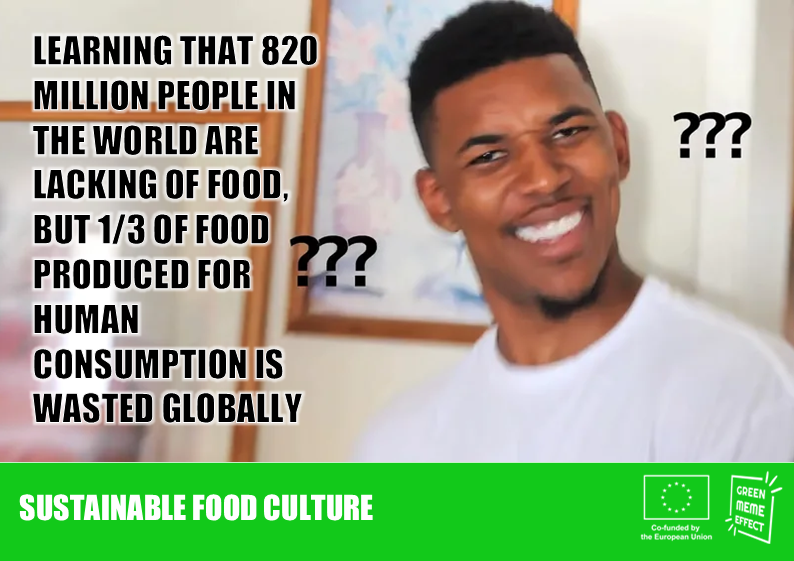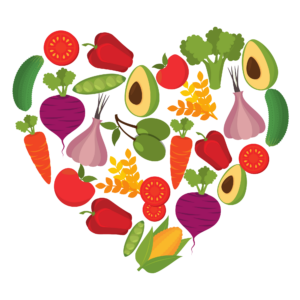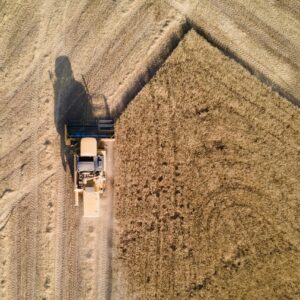SUSTAINABLE FOOD CULTURE
Let's Feed a New Future!

In recent years the concept of sustainability is a topic that has been the subject of several research and has increasingly occupied the public consciousness. Yet for young people this theme is still confusing, and few know that it is strictly linked to food.
But what does food sustainability actually mean?
Eating is an essential part of life and people know that the food they eat is something that can affect their health and body, but what they are less aware about is the big impact that food producing and consuming have on the entire planet.
That’s why is important to talk about sustainable food; a food to be sustainable must:
- provide good nutrition to us
- be a part of a production circle that helps social, economic and above all environmental issues
A CULTURE OF FOOD AFFECTING THE PLANET
In the oldest poem in the world, the Epic of Gilgamesh, an ancient Mesopotamian odyssey written in cuneiform on clay tablets, wild man differentiates himself from animals the moment he learns to eat bread and drink beer. The ability of transforming natural resources to create something edible that doesn’t exist in nature is one of the higher and exclusive evolutionary results of humans. Since ancient times, access to food resources has inspired our creativity, our intellect, has created conflicts as well as brought us to the discovery of new, uncharted lands.
People across the globe have developed different ways of getting and making food and built a personal relationship with the environment.

In other words, food is CULTURE and part of our IDENTITY!
 And now?
And now?
World’s population is growing very rapidly and could reach 10 billion by 2050! (World Population Data Sheet, 2020) According to the official statistics we are already unable to feed the entire population, which now is 8 billion (United Nations, 2022).
Moreover, it has been estimated that in the future 6 people out of 10 will live in an urban centre. That means with the gradual depopulation of the rural areas one day more and more people are going to eat food produced by few. Today 3% of the earth's surface is occupied by cities, but these consume 80% of the food produced. That’s why we are facing a massive production of food and the impact of ancient agriculture cannot be compared with modern technologies. Nowadays, farming industry is one of the major causes of environmental degradation: deforestation, pollution, greenhouse gas emissions (21-37%), freshwater consumption (70%), damage to biodiversity caused by pesticides and fertilizers. Increasing all of these would be devastating to the environment.
SUSTAINABILITY AND ACTIVE CITIZENSHIP: WHAT CAN WE DO ABOUT IT?
There is no doubt that this production system is no longer sustainable and governments all over the world must hurry to rethink this food culture and so assure a healthy and rich food supply for everyone that does not negatively affect our fragile ecosystem.
 But what is our role in all of this? Is there something that each of us could do?
But what is our role in all of this? Is there something that each of us could do?
The answer is yes. There is much you can do and each of us can make a difference to change his/her food habits towards more sustainable ones!
👉 Change your diet
About 2 billion people in the world suffer from obesity and overweight (World Obesity Atlas, 2022), moreover these diseases are among the leading causes of death and disability in the European Region, with recent estimates suggesting they cause more than 1.2 million deaths annually (WHO, 2022). Recent studies have shown a trend of people to choose calories-dense foods, packed with additives, preservatives, sugars, and saturated fats. Not only do we eat these unhealthy food, but we eat more than we should, considering that many of us have a sedentary lifestyle.
Try to change your diet using these suggestions:

- eat more vegetables and fruits
- choose seasonal food, it is more likely to be healthy and rich in vitamins and nutrients
- reduce the consumption of red meat (beef, pork, lamb etc.), methane produced by intensive farming generates more greenhouse gases than the transport sector and the production of animal feed is responsible for the destruction of large forests putting more and more pressure on land
- avoid junk food
- eat fresh food, poor in preservatives and additives
👉 Reduce Food Waste
One third of the entire world’s food production is wasted every year. According to the official data of FAO (Food and Agriculture Organization) this waste happens in the retail sale at the level of the final consumer, in other words us.
Food waste of developed countries is equal of the food production of Sub-sharan Africa (222 million of tons)
We can change our habits trying to:
- not buy more than we can eat (let’s start planning our meals during the week)
- not throw away food that is still edible. Many people follow too strictly the "best before" food labelling and throw away food that is still edible. This label does not have a mandatory meaning, so if the "best before" date has passed on a product, use your five senses to make sure that it has gone bad before throwing it away
- use all parts of the product (leftovers of vegetables and meats can be used in a lot of ways, for example for broth, to flavour your water, etc.)
- compost organic food scraps
The importance of reducing waste is also underlined by the European Union, which has included responsible production and consumption among its 17 goals for sustainable development established in 2015 (Goal 12). It aims to achieve the sustainable management and efficient use of natural resources, reducing by half the per capita global food waste at the retail and consumer levels as well as food losses along production and supply chains (see more at https://www.globalgoals.org/goals/12-responsible-consumption-and-production/ ).
👉 Be Aware of Your Choices
When people are grocery shopping, they usually do not pay any attention to the choice of the products. We just buy what we want to eat, without knowledge of the food source or the time of the year. This unintentional naiveté can lead to several consequences that are neither good for us nor for the environment.
Indeed, nowadays food is transported over longer distances, across the continents. This distance, from producer to consumer, is called food mile. Choosing products that are coming from far away is another factor that influences the unsustainability of our production system. Transporting food from one side of the planet to the other causes an enormous amount of pollution and gas emissions, negatively affecting the ecosystems. For example, do you know where bananas come from?
Have a look at this video: The Journey Of Bananas: From Land To Your Hand.
Moreover, these products are collected at an early stage of their maturation and kept in a big refrigerator during the transportation. This process makes vegetables and fruits lose their nutrients. The same happens when we choose non-seasonal products, which are grown in greenhouses and so lose their actual taste and their nutrition. According to a FAO survey over 2 billion people lack vitamins and mineral salts, such as iron, zinc, iodine etc.
Offer your contribution and try to:
- Buy organic products that respect nature and ecosystems, limiting the use of fertilizer or antibiotics.
- Buy local products that come from limited geographical areas around you and are produced in accordance with agricultural and social practices. This guarantees the quality and the good nutrition of the food!

RE-DESIGNING THE FOOD SYSTEM: WHAT THE EUROPEAN COMMUNITY IS DOING?
Ensuring healthy, good food whose production doesn't destroy our environment is an ambitious challenge that we obviously cannot accomplish by ourselves, we need the support of governments all over the world.
The European Community has a leading role in this context, signing in 2020 for a set of policy initiatives called “EU Green Deal” that aim of making the EU climate neutral by 2050. The overall strategy also focuses on food sustainability, indeed 8 billion will go to projects of research and food innovation, bio-economy, agriculture, farming and fishing industry, with a close look to urban food systems (urban agriculture, prevention and reduction of food waste etc.). For example, under the project “Nature Urbaine” Paris is building the largest urban farm of the world, with 14.000 square acres for growing fruits and vegetables and a splendid view of the Tour Eiffel!
One of the major initiatives of the European Commission is the “Farm to Fork Strategy”, aiming to make food production environmentally-friendly and at the same time guaranteeing healthy and high-quality products. To do this involving local authorities, rural and coastal communities will be essential.
Other projects are to be implemented, such as “FoodSHIFT 2030” (Horizon, 2020), that using 7,5 million is trying to increase the technological and societal food innovations in nine selected cities across Europe. The project promotes a plant-based diet, aims to reduce gas emissions and strengthen local production systems to increase the capacity of greenhouse communities to respond to today's environmental and food crises. If you want to know more about it, see the website of the project at https://foodshift2030.eu/ .
Try this quiz to see how much you know about Sustainable Food!
Bibliography:
- Campbell, D. (2023). More than half of humans on track to be overweight or obese by 2035-report. https://www.theguardian.com/society/2023/mar/02/more-than-half-of-humans-on-track-to-be-overweight-or-obese-by-2035-report#:~:text=About%202.6%20billion%20people%20globally,by%20the%20World%20Obesity%20Federation
- European Commission. (2023). Sustainable Food. https://wayback.archive-it.org/12090/20230310195327/https://ec.europa.eu/environment/archives/eussd/food.htm
- (2018). Sustainable Food System. Concept and Framework. https://www.fao.org/3/ca2079en/CA2079EN.pdf
- Ginori, A. (2020). Nature Urbaine, la fattoria verticale con vista Torre Eiffel. https://www.repubblica.it/green-and-blue/2020/10/05/foto/nature_urbaine_la_fattoria_verticale_con_vista_torre_eiffel-268270726/1/
- Harvard T.H. Chan. (n.d.). Sustainability.
- National Geographic. (n.d.). Sustainable https://www.hsph.harvard.edu/nutritionsource/sustainability/
- https://www.nationalgeographic.com/environment/article/sustainable-agriculture
- (2023). Sustainable Development Goal 12. https://en.wikipedia.org/wiki/Sustainable_Development_Goal_12
- (n.d.). Current world population. https://www.worldometers.info/world-population/#:~:text=8%20Billion%20(2022),according%20to%20the%20United%20Nations
To find out more about the meme used in the info card, click here.